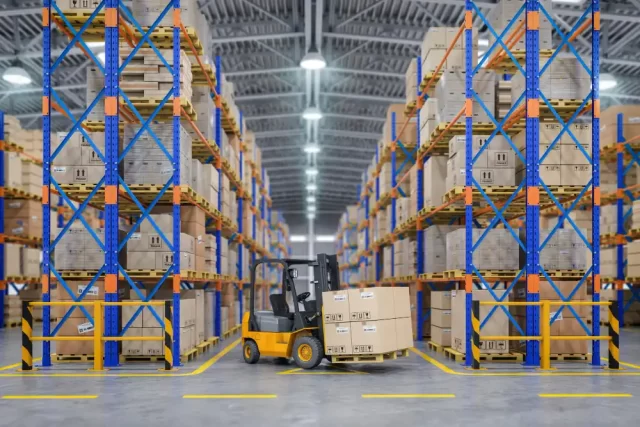Introduction:
When it comes to warehousing solutions, businesses often face the dilemma of choosing between private and public warehousing options. Each comes with its own set of advantages and considerations, tailored to different logistical needs and operational strategies. In this blog post, we delve into the key differences between private and public warehousing, helping you determine which option aligns best with your business requirements.
Understanding Private Warehousing
Private warehousing involves leasing or owning a dedicated storage facility exclusively for your company’s use.
Control and Customization:

Features: Private warehouses offer complete control over storage facilities, allowing businesses to customize layouts, security protocols, and operational workflows according to specific needs.
Advantages: This level of control enhances operational efficiency and ensures that storage space is optimized to meet exact requirements.
Cost Considerations:
Investment: Initial setup costs for private warehousing include leasing or purchasing the facility, as well as ongoing expenses for maintenance, staffing, and utilities.
Long-term Savings: Despite higher upfront costs, businesses can achieve cost efficiencies over time through reduced handling fees and better inventory management.
Scalability and Flexibility:
Scalability: Private warehouses are highly scalable, allowing businesses to expand or modify storage capacity as needed without external constraints.
Flexibility: This option provides flexibility in operational decisions, enabling businesses to adjust storage conditions and processes based on changing market demands.
Exploring Public Warehousing
In contrast, public warehousing offers shared storage space managed by third-party providers, accommodating multiple clients simultaneously. Here’s what sets it apart:
Accessibility and Convenience:
1. Immediate Availability: Public warehouses provide readily available storage space, allowing businesses to quickly scale operations without significant setup time.
2. Location Benefits: They are strategically located near transportation hubs, offering convenient access to major highways, ports, or airports.
Cost Efficiency:
No Capital Investment: Public warehousing eliminates upfront capital investments associated with facility ownership or long-term leasing commitments.
Pay-as-You-Go:
Businesses pay only for the space and services utilized, making it a cost-effective solution for short-term storage needs or seasonal fluctuations.
Shared Resources:
Shared Services: Public warehouses offer shared resources such as labor, equipment, and technology, reducing operational overheads and providing access to specialized services.
Choosing the Right Option for Your Business
Factors to Consider:
Business Strategy: Evaluate your long-term growth plans and logistical requirements to determine whether a dedicated or shared storage solution aligns with your business goals.
Cost Analysis: Conduct a thorough cost-benefit analysis considering initial investments, operational expenses, and potential savings associated with each warehousing option.
Operational Needs: Assess factors such as inventory volume, handling requirements, regulatory compliance, and the need for customization or specialized storage conditions.
Flexibility and Scalability: Consider the agility required to adapt to market fluctuations, seasonal demands, and evolving customer expectations when selecting a warehousing strategy.
Conclusion:
Choosing between private and public warehousing hinges on understanding your business’s unique operational needs, growth objectives, and financial considerations. Whether opting for the control and customization of private warehouse in Chennai or the flexibility and cost efficiency of public warehousing, selecting the right solution can significantly impact your supply chain efficiency and overall business success.
Frequently Asked Questions (FAQ)
Is private warehousing more cost-effective than public warehousing?
Private warehousing can offer long-term cost efficiencies through customized solutions and reduced handling fees, whereas public warehousing provides immediate cost benefits with no upfront investments.
What are the benefits of private warehousing?
Private warehousing provides businesses with enhanced control, security, and customization options tailored to their operational requirements. It allows for long-term cost efficiencies through reduced handling fees and optimized inventory management.
How does flexibility differ between private and public warehousing?
Private warehousing offers greater flexibility in customization and operational control, while public warehousing provides flexible, pay-as-you-go storage solutions ideal for fluctuating business needs
What factors should I consider when deciding between private and public warehousing?
Consider factors such as your business growth trajectory, operational scalability, budget constraints, and the need for specialized storage conditions or shared resources.
Can I switch from public to private warehousing (or vice versa) as my business grows?
Yes, many businesses transition between warehousing options based on evolving needs. Evaluate your current requirements and future projections to determine the optimal solution.





